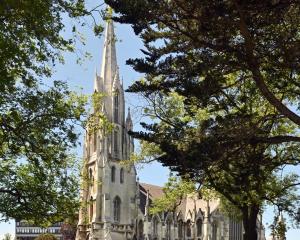
As the lower South Island reels from news that the government has broken its election promise on building the new Dunedin hospital, the week in which it was announced was nationally significant for more than one reason.
The pre-election social contract Prime Minister Christopher Luxon made with Otago/Southland voters has been seriously undermined, taking with it a good deal of respect for him and those politicians who attempted to justify their call with flimsy excuses.
In the same week, ANZ Bank chief executive Antonia Watson also headlined with her backing of the introduction of a capital gains tax.
Good on her. She reminded us yet again that New Zealand is one of the few developed countries in the world without such a tax.
Until 1992, New Zealand had a comprehensive tax regime of "estate and death duties" that had been in existence for well over 100 years. A tax was levied on the wealth accumulated over one’s lifetime before any inheritances were paid out. And New Zealand until that time was able to build all necessary infrastructure when and where it was required — roads, rail networks, bridges, schools, housing, airports, hospitals and universities that we were even paid to attend.
Huge thanks to my forebears’ generations for this contribution to building our nation.
It is glaringly obvious that New Zealand’s tax base has since become totally inadequate, and that the projections ahead for any government to provide the level of spending necessary to cover off even the most basic social services show we urgently need billions more in tax revenue.
Luxon’s rapid response to Watson’s timely reminder was dismissive, flippant and ill-judged. He glibly stated that we don’t tax our way out of recession: "We grow our way out of it".
Another of Luxon’s pre-election promises was made to property investors.
Labour had earlier removed the tax deductability of mortgage interest on existing residential properties held by investors. This was in response to the sharply declining rates of home ownership as investors always held the advantage of this perk where young first-home buyers missed out, being easily outbid at property auctions because of this difference.
National made this a priority piece of legislation in their first 100 days, and the billions in this foregone tax revenue that now are flowing back into property investors’ pockets would have fully paid for Dunedin’s new hospital. So the agenda is set for "growing our way into prosperity", in the non-productive rental property market if you can afford to join the club. And as an extra inducement, the bright-line test for taxing capital gains on investment properties bought for resale has also been reduced from 10 to two years.
In that same week, yet another pulp and paper mill and the large Timaru meatworks announced their closures, adding to the growing unemployment figures.
Yes, growth is certainly happening.
Our most successful and popular politicians have long recognised the need to guide their nation with hope for the future. And that hope is built squarely on opportunities.
We are a fair-minded population, and understand when austerity needs to be reckoned with. However, we do expect everyone to "take one for the team", especially those who can more easily afford it.
When the funding of essential social services is cut as with the case of Dunedin’s new hospital, let us welcome a broader examination of taxation policy to address what is so obviously required.
This fiasco is enough to make any prime minister’s chief press secretary hand in their notice.
• Nick Loughnan is an Alexandra farmer.










